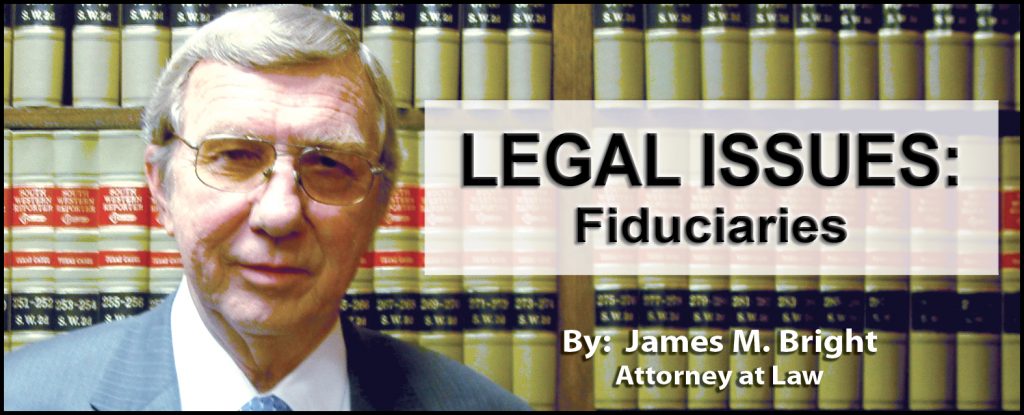The following is provided for informational purposes only and is not, nor should it be construed as legal advice.
According to Black’s Law Dictionary, “The term ‘fiduciary’ is derived from Roman law and means (as a noun) a person holding the character of a trustee or a character analogous to that of a trustee in respect to the trust and confidence involved in it and the scrupulous good faith and candor which it requires. A person having duty, created by his undertaking, to act primarily for another’s benefit in matters connected with such undertaking.”
From a layman’s point of view and as most commonly used in Wills, the fiduciary positions most commonly referenced are those of an executor (or executrix which is the feminine version of executor) or trustee. Although each of these fiduciary positions may be held by the same person, there are some rather basic differences with duties of executor and trustee as follow:
EXECUTOR
This is the person or corporate entity that will be responsible for gathering the assets of the estate and then distributing them in accordance with instructions found in the Will.
For example, if the Will makes a gift of “all real property which I may own at the time of my death in equal shares to my four children, share and share alike,” the fiduciary, executor must look to the Will for further instruction. If it states that distribution may be made “in cash or in kind,” then the executor may do one of several things:
1. He/she may sell the property and distribute the cash to the heirs in equal shares;
2. If the property is of a type and nature that it may be divided equally with each heir receiving an equal portion, then it may be divided in that manner (again, we must look to an instruction in the Will).
3. If the property cannot be equitably split and the executor has determined that it may not be in the best interest of the estate to make an immediate sale, the real property may be distributed by preparing an executor’s deed which will place title to the property in each heir as an undivided percentage interest in the whole.
Another example could be “a gift in trust for the benefit of children, grandchildren, a parent, etc.” The executor would typically be charged with paying over the assets to fund a trust to the named trustee of that trust for the benefit of the person or persons named. Once those funds are paid or assets turned over to the trustee, the executor’s job is done as relates to the trust.
The executor will also be required to pay and negotiate settlement of any debts owed by the decedent and to file an inventory of assets with the court.
The executor’s duties are usually much shorter lived than those of the trustee.
TRUSTEE
The trustee will accept “legal” title to the property gifted, hold it and manage it for the benefit of the person named in the Will. For example: Trusted friend, family member, etc. (trustee) would accept title for the benefit of your child or grandchild (beneficiary).
The duties of the trustee can vary dramatically between trusts, but each trustee will be guided by the Texas Trust Code and your specific instructions.
When does the trust end and the funds paid over to the beneficiary? Age 25? Age 30? Age 45, etc.?
During the life of the trust, are any payments to be made to the beneficiary or is everything paid in one lump sum when the trust ends?
During the life of the trust, is the trustee authorized to pay income only or is he/she allowed to invade the corpus of the trust?
If payments are to be made, are they for any purpose or only limited to needs such as health or education?
The answers to each of the above questions is dependent upon the instruction given by you in the trust instrument.
As is readily discernable, the trustee’s active duties last much longer than those of the executor and may require some fairly detailed accounting during the term of the trust. The complexities of the trustee’s duties are established by you at the time that the document is drafted.
Many times during my own practice, I am asked if the executor and trustee can be the same person. The answer is yes. It is not at all uncommon for a trusted friend or family member to serve in both of these fiduciary positions.
Questions sometime arise regarding the requirements for a corporate fiduciary to serve. They may serve if they are a bank or trust company having trust powers existing or doing business under the laws of Texas or of the United States which is authorized to act under the order of appointment of the court as an executor, administrator, guardian, trustee, receiver or depository. Tex. Est. Code § 22.006.
The fiduciaries selected need not be boy scouts, but they should be persons or entities that could live up to that part of the motto requiring scouts to be trustworthy and loyal. Desirable attributes would include sound judgment, an ability to be fair and impartial and a degree of integrity that places your instruction before any personal gain.
James Bright has been admitted to practice before the Federal Courts for the Southern District of Texas and Eastern District of Texas as well as all of the Justice Courts, Probate Courts, County Courts at Law, District Courts, Courts of Appeal and Supreme Court for the State of Texas. He maintains an office in Houston and by appointment another at 208 McCown Street in the heart of historic Montgomery. Contact may be made by telephone (936) 449-4455 or (281) 586-8277. For more information about wills or probate in Texas, please see- www.houstontxprobate.com
IF YOU WISH TO SUGGEST A TOPIC FOR THIS COLUMN, SEND TO:
JAMES M. BRIGHT
14340 TORREY CHASE BLVD., SUITE 150
HOUSTON, TEXAS 77014
Email: topics@houstontxprobate.com
